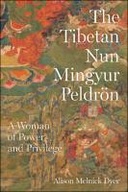Explore

The Tibetan Nun Mingyur Peldrön
Alison Melnick Dyer
2022
0 Ungluers have
Faved this Work
Login to Fave
Born to a powerful family and educated at the prominent Mindröling Monastery, the Tibetan Buddhist nun and teacher Mingyur Peldrön (1699–1769) leveraged her privileged status and overcame significant adversity, including exile during a civil war, to play a central role in the reconstruction of her religious community. Alison Melnick Dyer employs literary and historical analysis, centered on a biography written by the nun's disciple Gyurmé Ösel, to consider how privilege influences individual authority, how authoritative Buddhist women have negotiated their position in gendered contexts, and how the lives of historical Buddhist women are (and are not) memorialized by their communities. Mingyur Peldrön's story challenges the dominant paradigms of women in religious life and adds nuance to our ideas about the history of gendered engagement in religious institutions. Her example serves as a means for better understanding of how gender can be both masked and asserted in the search for authority—operations that have wider implications for religious and political developments in eighteenth-century Tibet. In its engagement with Tibetan history, this study also illuminates the relationships between the Geluk and Nyingma schools of Tibetan Buddhism from the eighteenth century, to the nonsectarian developments of the nineteenth century. The open access publication of this book was made possible by a grant from the James P. Geiss and Margaret Y. Hsu Foundation.
This book is included in DOAB.
Why read this book? Have your say.
You must be logged in to comment.
Rights Information
Are you the author or publisher of this work? If so, you can claim it as yours by registering as an Unglue.it rights holder.Downloads
This work has been downloaded 27 times via unglue.it ebook links.
- 27 - pdf (CC BY-NC-ND) at Unglue.it.
Keywords
- Asian history
- Buddhism
- Gender studies, gender groups
- Gender studies: women
- Gender studies: women and girls
- History
- Humanities
- Regional & national history
- Religion & beliefs
- Social groups
- Society & culture: general
- Society & Social Sciences
Links
DOI: 10.6069/9780295750378Editions

